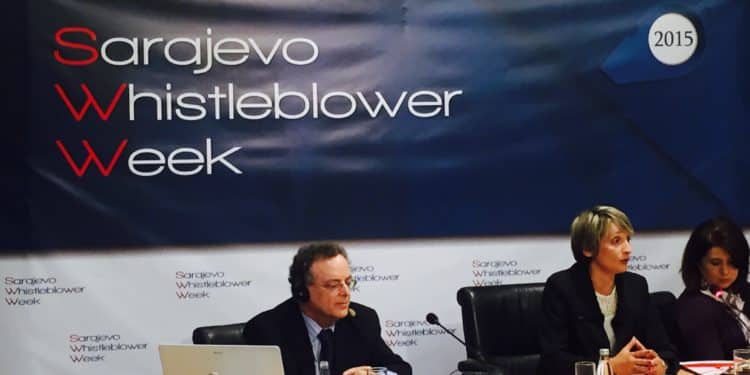The following is a guest blog by Bojan Bajic.*
Sarajevo Whistleblower Week (SWW) 2015, which occurred in the last week of May in Sarajevo was seen in a light of “clash” of two approaches: the first one representing pro-active American approach providing a “incentive based protection” to a whistleblower and the second passive European anti-retaliation whistleblower protection.
A special guest of this SWW event was Mr. Stephen M. Kohn, partner at Kohn, Kohn & Colapinto, LLP and the Executive Director of the National Whistleblower Center from Washington D.C., who gave his lecture on how whistleblowers from around the world can use the U.S. laws to expose corruption: “Breakthrough in Protecting International Whistleblowers: Non-United States Citizens Now Entitled to Whistleblower Protections and Rewards.”
The organizers witnessed a huge interest in this seminar, as nationals from over 25 countries watched the event through a live stream, and one whistleblower, accompanied by his lawyer, came to Sarajevo from his European country to attend the event in person.
This interest for American regulations that protect non-US whistleblowers throughout Europe obviously shows that a reward system works. It gets results. In closing, it enables effective whistleblowers protection in everyday life, as it guarantees confidentiality and whistleblowers rewards as the best protection mechanism for anticipated risk. Reward as a concept represents an opportunity for a whistleblower to launch his new career, as he frequently becomes isolated despite of his great merits in preserving public interest. Frequently, it happens that a whistleblower receives recognition from the highest public and state levels, but still is unable to get another employment. To this end, a whistleblower reward system should be regarded as effective protection and compensation to an individual who discloses irregularities and endangers himself, whereas he did not have to act in such fashion: he could remain silent as many people do.
Speaking of whistleblower protection and whistleblowing promotion in Europe, one could state that a current situation has not been favorable. By reviewing traditional anti-retaliation laws there is a rough distinction between the laws providing a court protection (passive anti-retaliation concept) and other laws providing prior court proceedings remedy through specialized whistleblower offices (proactive anti-retaliation concept), it could be noted that Europe has had passive stance even at the field of its traditional protection. It is likely to expect that a half of European countries do not have laws providing court safeguard, while one or two countries have specific laws stipulating specialized whistleblower offices that safeguard the whistleblower’s job by imposing administrative measures and sanctions (to an employer) prior initiating potential court proceeding.
In this regard, Bosnia-Herzegovina is a pioneer. It should be noted that it is of utmost importance to protect whistleblowers immediately, as slow and hard-to-prove court proceeding can lead to justice at the end. Nevertheless, if they take several months one could state that justice has been served but whistleblower suffered huge, permanent and discouraging consequences. There is a local saying that illustrates very well a traditional anti-retaliation whistleblower protection: “ The surgery was performed well, but a patient died”
In Europe, there is a huge philosophical discussion underway on whistleblowing, focused on seeking ethical issues in receiving incentive and awards by whistleblowers, which have not substantiated by some studies, like the one conducted by the University of Chicago Booth Scholl of Economics Study on Impact of Whistle blowing. This particular study indisputably determined that : 1.‘’(T)here is no evidence that having stronger monetary incentives to blow the whistle leads to more frivolous suits’’, and 2. ‘’Monetary incentives… work well, without negative side effects often attributed to them’’.
At the same time, there has been a ‘revolution’ underway in the U.S. targeting public interest protection through whistleblowing, in particular by use of confidentiality safeguards and rewards.
We, Europeans, have been rejecting the US model, as non-applicable by default with no substantive argument. However, we have been witnessing that American ‘revolution’ of incentive led whistle blowing has been spreading through Europe with many practical examples such as German Siemens, Swiss USB Bank and many others. This article about incentive based whistle blowing in Europe, in the light of most recent and appalling events in FIFA, could be finished on just one possible way…to be continued.
* * *
* Bojan Bajic is a partner at Net Consulting ltd – leading whistle blower ‘hotline’ provider in the region and the Program Manager for Whistle Blower protection at Center for Responsible Democracy ‘Luna.’


